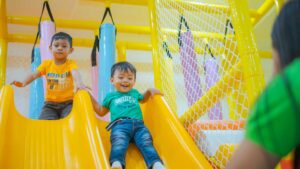How does autism affect relationships?
Friendship is one of the most meaningful bonds we can form throughout life. It’s not just about sharing likes and dislikes or spending time together, but about feeling seen, accepted, and supported. When we talk about autism and friendship, building these connections can be a nuanced, challenging, and learning process. Approaching autism and friendship is not just about relationships but about empathy, bridges, and how we can support each neurodiverse individual in their unique way of being in the world.
One question that often arises is: How does autism affect relationships? The answer is neither simple nor universal. Autism can influence how a person interprets social cues, expresses emotions, or responds to stimuli in their environment. These challenges don’t mean that those on the spectrum don’t want or can’t have friends, but that their paths to building relationships may be different. And that’s where we all – family, professionals, teachers, and friends – have an important role to play.
In this blog by ABA Centers of Pennsylvania, we will explore the main challenges around autism and friendship, the importance of social interactions in emotional well-being, strategies for fostering meaningful connections, and how interventions like ABA therapy can support these processes. If you have ever wondered how you can help a person with autism in their relationships, keep reading!
Autism and Social Interaction: Challenges and Realities
To support autism and friendship, it’s essential first to understand the unique experiences of individuals with autism. Autism Spectrum Disorder (ASD) is a developmental condition that impacts communication, social interaction, and behavior. Characteristics can vary widely among individuals but may include:
- Difficulties interpreting social cues, such as body language, tone of voice, and facial expressions
- A preference for routine and predictability, which may influence social interactions
- Unique ways of expressing emotions and understanding relationships
- Challenges initiating or maintaining conversations

Social interaction is one area where individuals with autism can face significant difficulties. For example, something as usual as knowing when to start or end a conversation can be confusing or overwhelming.
These factors can make traditional friendship models feel less accessible for individuals with ASD. In addition, they may show different communication patterns, such as very literal language or intense interest in specific topics. These traits can sometimes generate misunderstandings with other children or adults, who don’t always know how to respond or connect from that place.
According to an article in Autism Speaks social challenges do not arise from a lack of interest in relationships but from neurological differences in the way people with ASD process social information. It is not about “lack of skills” but about different ways of interacting that can benefit from companionship, patience, and understanding.
Making Friends with Autism: Why is it so Important?
Having friends is valuable not only from an emotional point of view. Social relationships help develop skills such as empathy, self-regulation, conflict resolution, and self-esteem. For children, teenagers, and adults with autism, friendship can become a safe space where they feel accepted and valued just as they are.

Social isolation is a real risk when we ignore or minimize the difficulties that people with autism face when trying to integrate socially.
The Journal of Autism and Developmental Disorders revealed that people with autism experience higher levels of isolation compared to the neurotypical population. This finding challenges the stereotype that people on the spectrum prefer to be alone. In fact, numerous studies show that they desire to establish meaningful social bonds as well as their neurotypical peers.
In addition, in this study, teens with autism have reported high levels of emotional and social loneliness, even when they engage in frequent social interactions. Friendships, in these cases, are often marked more by closeness in shared activities than by deep emotional connection.
However, this does not imply a lower value for friendship. Individuals with autism may experience relationships differently, but with the same need for connection and belonging.
The Benefits of Supporting Autism and Friendship
Autism and friendship are topics we should support to help the personal growth and well-being of our loved ones on the spectrum. Making friends with autism can bring multiple benefits, such as:
- Social Development: Friendship offers a safe environment to learn and practice social skills, such as engaging in two-way conversations, turn-taking, and sharing.
- Cognitive Growth: Social interactions often encourage creative thinking, problem-solving, and empathy, contributing to mental development.
- Emotional Support: Having supportive friends reduces feelings of loneliness, isolation, anxiety, and depression while boosting self-esteem and overall happiness.
- Sense of Belonging: Being accepted by a friend counterbalances societal pressures and fosters a sense of inclusion, helping individuals feel valued and understood.
Autism and Social Skills: How Can We Help To Strengthen Them?
Developing social skills for people with autism does not mean “forcing” them to behave like others but helping them identify tools that allow them to communicate and relate more effectively according to their own preferences.
Among the most essential skills are:
- Recognizing one’s own and other’s emotions
- Waiting for turns when speaking or playing
- Understanding non-verbal language
- Resolving conflicts in a respectful manner
- Asking for help or expressing a need

These skills do not always develop naturally, but people with autism can learn them with structured, tailored methods such as ABA therapy. An approach based on consistent practice, modeling, and positive feedback can make a big difference.
Strategies for Encouraging and Facilitating Friendships From Authenticity
Making friends with autism is not about fitting into rigid social molds. Instead, it’s about creating spaces where they can show who they are, share genuine interests, and feel safe in the interaction.
Caregivers, educators, and therapists play a vital role in supporting autism and social interaction. Here are actionable steps to help your child:
- Start Conversations About Autism and Friendship: Explain the concept of autism and friendship in simple, relatable terms. Highlight values like kindness, empathy, and shared joy to help your child understand what being a friend entails.
- Identify Shared Interests: Encourage activities that align with your child’s passions, such as art classes, sports, tech workshops, or nature clubs. Shared interests often serve as a gateway to forming connections.
- Host Structured Playdates: Organize small, structured playdates to provide a controlled environment where your child can interact and build social skills. Planning social interactions into your loved one’s weekly schedule and routines can provide reassurance and comfort. Gradually include new places to socialize and meet more people.
- Use Role-Playing: Practice everyday social situations with your child, such as introducing themselves, joining a game, or complimenting a peer. Role-playing builds confidence and prepares your child for real-life scenarios.
- Find Social Groups: Autism support groups in Pennsylvania can encourage your child or teen to socialize with peers who have the same interests and understand their needs. At ABA Centers of Pennsylvania, we create autism-friendly environments and events for our clients to make friends and have fun.
- Model Social Skills: Demonstrate behaviors like active listening, polite conversation, and expressing gratitude so your child can observe and learn from you.
- Use Visual Supports: Conversation scripts, emotion cards, or social diaries are great tools for approaching autism and friendship.
The Role of ABA Therapy in Autism and Social Skills
ABA (Applied Behavior Analysis) Therapy is one of the most widely used and supported interventions in the treatment of autism. One of its key focuses is the development of functional skills, including social skills.
Through individualized techniques, the ABA therapist can help a person identify patterns of behavior that interfere with social interaction and replace them with more effective behaviors. For example, they can teach how to initiate a conversation, maintain eye contact if it is comfortable for the person, or respond appropriately to another’s emotion.

A study by BMC Psychology showed that interventions focused on social skills with an ABA approach achieved significant improvements in the ability to initiate and maintain social interactions in children and adolescents with autism.
The most valuable aspect of this approach is that it adapts to each individual, respecting their pace, communication style, and unique way of relating.
ABA Centers of Pennsylvania: Supporting Autism and Friendship
Autism and friendship are not opposites. While the path to building relationships may be different, it is no less valuable. Individuals with autism have both the desire and ability to form deep bonds, provided they have the right environment, appropriate strategies, and, above all, understanding.
Let us remember that every effort to understand, teach, and accompany with respect can open the door to a meaningful friendship. If you are part of the environment of someone with autism, your role can be decisive in supporting the individual in their unique way of being in the world.
Remember that there are methodologies that can support the development of autism and social skills, such as ABA therapy.
If you want to learn more about how ABA Centers of Pennsylvania provides support for autism, social skills, and more, call us at (844) 444-7496 or connect with us online. Every step counts, and you’re not alone on this journey.








